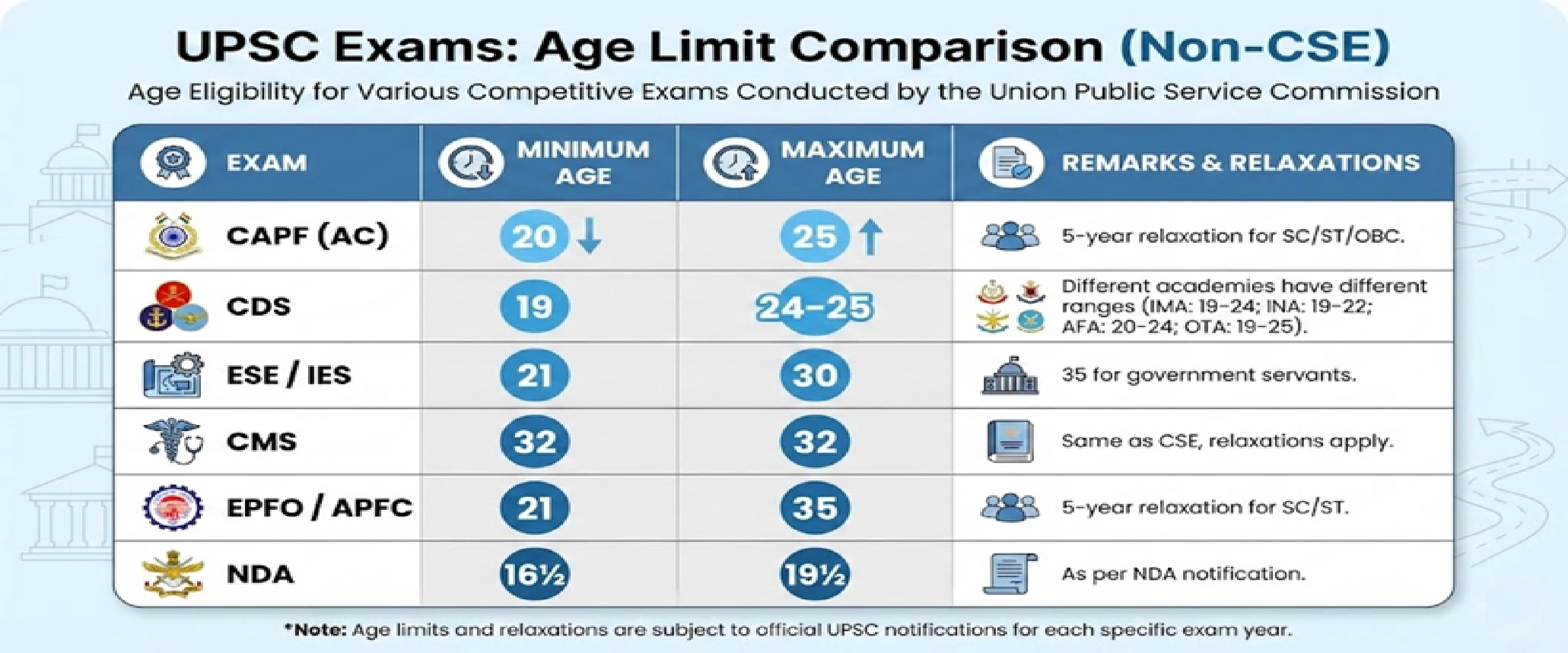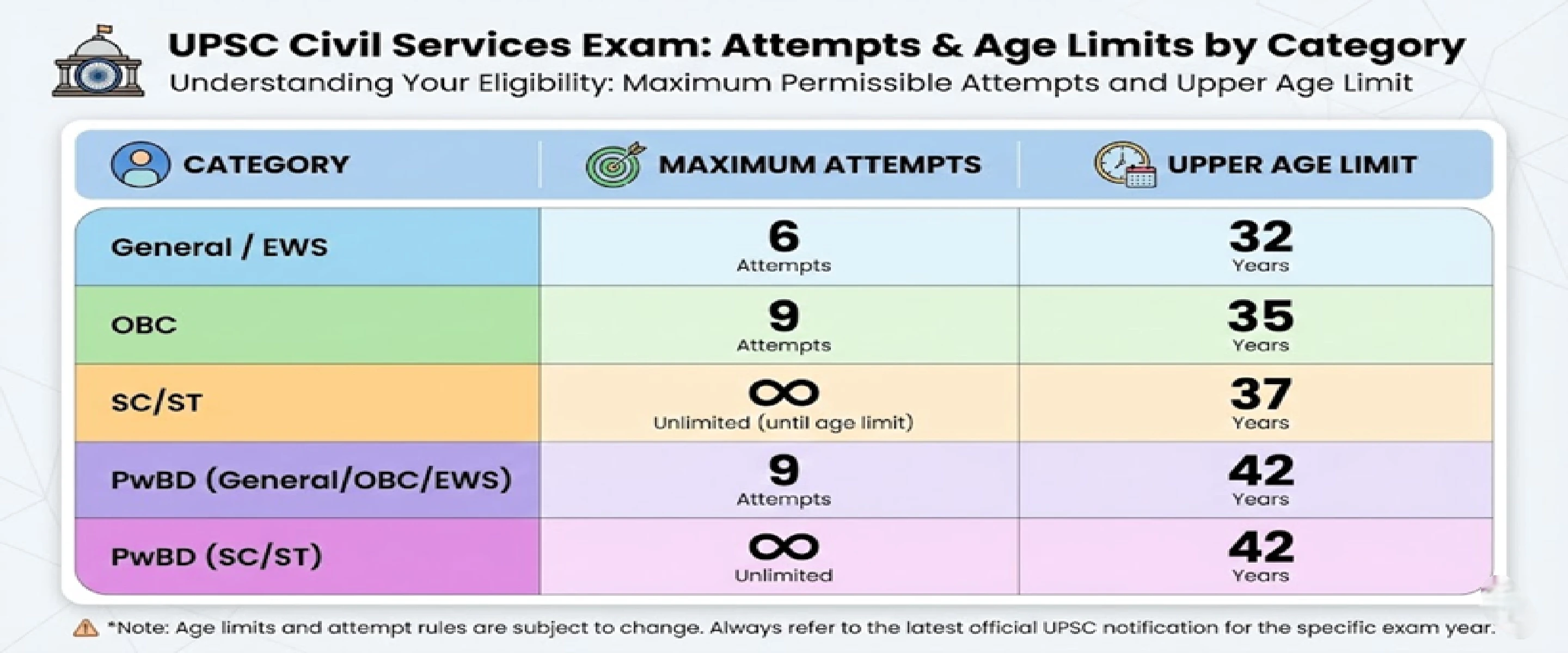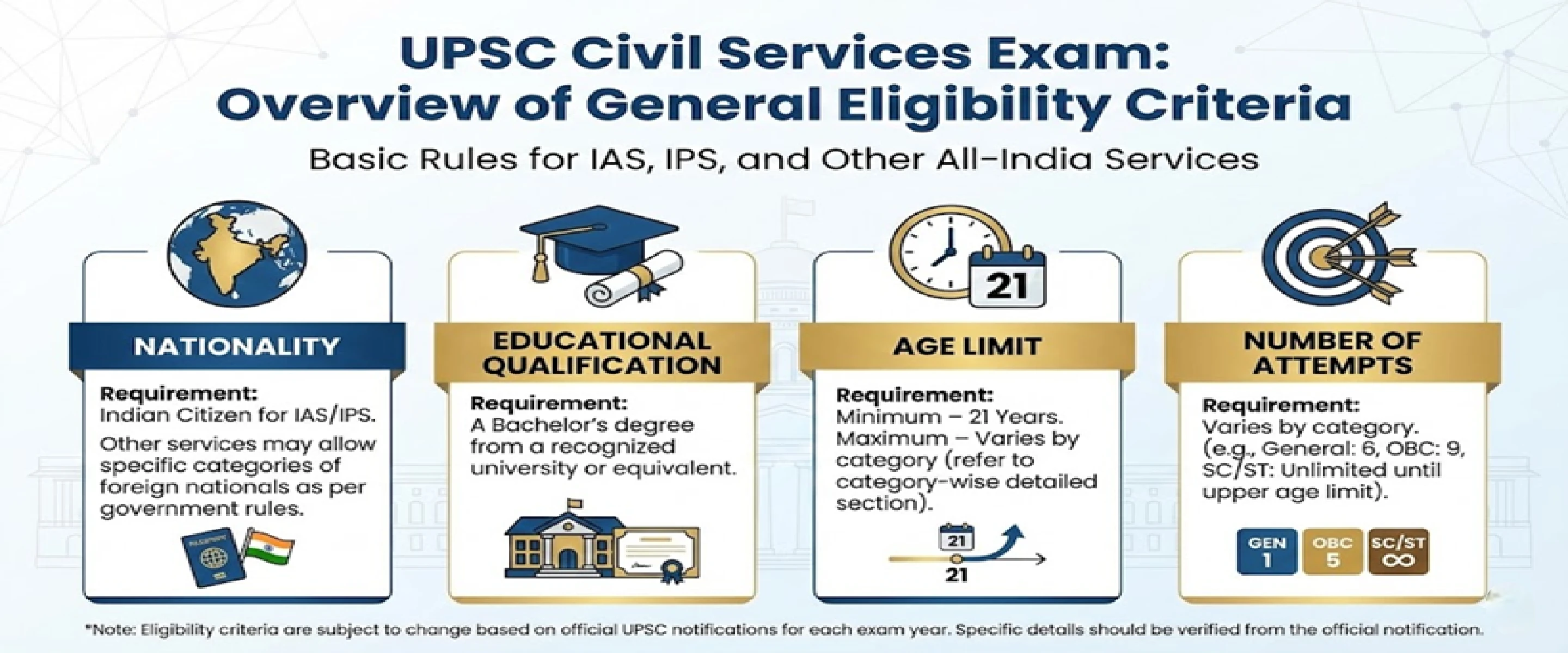UPSC Age Limit 2026: Eligibility Criteria
Strategy
UPSC Prelims
Current affairs
Latest Update

Gajendra Singh Godara
Mar 11, 2025
10
mins read
The UPSC Civil Services Examination (CSE) is India’s most competitive exam. It is also one of the most inclusive. Candidates from every background, region, and profession attempt it to serve the nation. To ensure a balance between fairness and opportunity, the UPSC age limit acts as both a filter and a safeguard.
It sets a minimum threshold of maturity and an upper boundary that keeps the competition equitable. Age relaxations help create fairness for groups that have faced disadvantages. They remind us that merit and inclusivity should go hand in hand.
UPSC Age Limit by Category
The upper age limits are relaxed for certain categories as per government rules. The table below shows the age limits for the UPSC Civil Services Examination 2026. It includes both minimum and maximum ages for each category.
Category | Minimum Age | Maximum Age (Upper Age Limit) | Attempts |
General (UR) | 21 years | 32 years | 6 |
EWS (Economically Weaker Section) | 21 years | 32 years | 6 |
OBC (Other Backward Classes) | 21 years | 35 years | 9 |
SC/ST (Scheduled Castes/Tribes) | 21 years | 37 years | Unlimited (Up to age limit) |
PwBD (Persons with Benchmark Disability) – General/EWS | 21 years | 42 years | 9 |
PwBD – OBC | 21 years | 45 years | 9 |
PwBD – SC/ST | 21 years | 47 years | Unlimited (Up to age limit) |
Ex-Servicemen | 21 | 37 | As per relaxation |
Defence Personnel | 21 | 35 | As per rule |
J&K Domicile | 21 | 37 | Category-based |
For the UPSC CSE 2026, the candidate must be between 21 and 32 years as of 1 August 2026.
This means:
The candidates must have been born not earlier than 2 August 1994 and not later than 1 August 2005.
Example: If you belong to the General category and were born on 15 July 1994, you cannot apply for UPSC 2026. You will be over the 32-year age limit by the cut-off date.
(a) General Category
Age Limit: 21 – 32 years
Relaxation: None
Attempts Allowed: 6
The UPSC age limit for general category candidates allows about 11 years to compete (ages 21 to 32). During this time, candidates can make six attempts.
(b) OBC Category
Age Limit: 21 – 35 years
Relaxation: 3 years beyond general limit
Attempts Allowed: 9
OBC candidates enjoy both an age relaxation and extra attempts, recognizing structural disadvantages and ensuring broader representation.
Example: An OBC candidate aged 34 on 1 August 2026 is still eligible to appear in UPSC 2026.
(c) SC/ST Category
Age Limit: 21 – 37 years
Relaxation: 5 years beyond general limit
Attempts Allowed: Unlimited (until age limit)
This extended window honors the principle of equity in access to administrative services.
(d) EWS (Economically Weaker Section)
Age Limit: 21 – 32 years
Relaxation: None beyond general limit
Attempts: 6
While EWS benefits apply in reservation of seats, no additional age relaxation is currently granted beyond the general criteria.
(e) PwBD (Persons with Benchmark Disabilities)
Age Limit: Up to 42 years (general PwBD)
Relaxation: 10 years across categories
PwBD applies to disabilities in the Rights of Persons with Disabilities Act 2016. These include locomotor, visual, hearing, and intellectual disabilities.
(f) Ex-Servicemen
Age Limit: Relaxation of 5 years beyond the general limit.
Applicable to commissioned officers and ECOs/SSCOs who have rendered at least 5 years of military service.
(g) Defence Services Personnel (Disabled in Operations)
Age Relaxation: Up to 3 years, subject to service certificate verification.
(h) Central & State Government Employees
Certain categories of government servants receive up to 5 years of relaxation if they have served continuously in a qualifying department under government regulations.
(i) J&K Domicile Candidates
Candidates domiciled in the erstwhile state of Jammu & Kashmir during 1 January 1980 – 31 December 1989 receive a relaxation of 5 years in the upper age limit.
(j) Female Candidates
There is no separate UPSC age limit for female aspirants; age criteria depend solely on their category (General, OBC, SC/ST, etc.).
However, growing participation from women has prompted the Commission to provide equal representation through reserved services and facilities such as maternity-related attempt considerations.
Calculate Eligibility for UPSC by using UPSC Age Calculator. The UPSC Eligibility Age Calculator by PadhAI helps you instantly check whether you meet the age criteria for the Civil Services Examination or not.
Age Limit for Other Exams Conducted by UPSC
While CSE is the flagship, UPSC also conducts several other exams. Here’s an Age Limit comparison table for CAPF (AC), CDS, ESE/ IES, CMS, EPFO/ APFC, NDA.

Exam | Minimum Age | Maximum Age | Remarks |
CAPF (AC) | 20 | 25 | 5-year relaxation for SC/ST/OBC |
CDS | 19 | 24–25 | Different academies have different ranges (IMA: 19-24; INA: 19-22; AFA: 20-24; OTA: 19-25) |
ESE / IES | 21 | 30 | 35 for government servants |
CMS | 32 | 32 | Same as CSE, relaxations apply |
EPFO / APFC | 21 | 35 | 5-year relaxation for SC/ST |
NDA | 16½ | 19½ | As per NDA notification |
UPSC Attempts Limit
The number of permissible attempts in the UPSC exam also varies by category. Below is a Table of the maximum number of attempts allowed for different categories:

Category | Maximum Attempts | Upper Age limit |
General / EWS | 6 | 32 |
OBC | 9 | 35 |
SC/ST | Unlimited (until upper age) | 37 |
PwBD (General/OBC/EWS) | 9 | 42 |
PwBD (SC/ST) | Unlimited | 42 |
Important: Every appearance in the Preliminary Exam counts as one attempt, even if you do not qualify for Mains. However, if you fill the form and skip the exam entirely, it does not count.
UPSC Age Limit and Educational Qualification – Combined View
This table defines the full UPSC eligibility, not only the academic aspect but also the temporal one.
Parameter | Eligibility |
Education | Bachelor’s degree (any stream) |
Final-year Students | Eligible provisionally |
Age | 21 – 32 (General) |
Upper Relaxations | As detailed above |
Why Does UPSC Impose an Age Limit?
The age requirement comes from how we manage civil services. These roles need maturity, good decision-making, and adaptability. These qualities often improve with age but can decrease in flexibility after a certain point.
Historically, since the British era, age rules have helped ensure candidates are young enough to serve a full term. They also need to be experienced enough to manage complex governance tasks. The UPSC civil services age limit thus balances youthful energy with institutional responsibility.
Moreover, age relaxations reflect India’s constitutional promise of equality, accommodating socio-economic disparities while maintaining overall competitiveness.
Overview of UPSC Exam Eligibility Criteria
Before discussing the UPSC age limit, let's first go over the general eligibility rules. These rules apply to IAS, IPS, and other All-India Services in the CSE:

Eligibility Factor | Requirement |
Nationality | Indian citizen for IAS/IPS; other services may allow certain categories of foreign nationals as per rules |
Educational Qualification | A bachelor’s degree from a recognized university |
Age Limit | Minimum – 21 years; Maximum – as per category (explained below) |
Number of Attempts | Varies by category (general – 6, OBC – 9, SC/ST – unlimited until age limit) |
UPSC Eligibility Nationality Criteria
The nationality requirement varies slightly depending on the service:
For Indian Administrative Service(IAS), Indian Police Service(IPS) and Indian Foreign Service(IFS):
The candidate must be a citizen of India.
Only Indian citizens are eligible for the IAS and IPS positions.
Foreigners and some people of Indian origin cannot use these two services. These positions are only for Indian nationals.
For all other services the candidate must be either:
A citizen of India, or
A subject of Nepal, or
A subject of Bhutan, or
A Tibetan refugee who came to India before 1st January 1962 with the intention of permanently settling in India, or
A person of Indian origin (PIO) is someone who has moved from specific countries. These countries include Pakistan, Burma/Myanmar, Sri Lanka, Kenya, Uganda, Tanzania, Zambia, Malawi, Zaire (Democratic Republic of Congo), Ethiopia, or Vietnam. They intend to settle in India permanently.
Candidates from categories (2), (3), (4), or (5) can take the exam. This includes people from Nepal, Bhutan, Tibet, or those of Indian origin. This is for services other than IAS, IPS, or IFS. However, they need a Certificate of Eligibility from the Government of India.
Plan of UPSC Journey According to Age
Strategically plan your UPSC Civil Services Examination preparation by aligning your efforts with your current age bracket.
If You’re 21–24 Years Old
You are in the perfect window to start early. Build conceptual clarity, strengthen your GS foundation, and prepare for multiple attempts.
If You’re 25–28 Years Old
You’re entering your peak performance zone. Balance work and be consistent in upsc preparation. Aim to clear prelims within 1–3 years.
If You’re 29–32 Years Old (General)
Use your maturity and experience to your advantage. Focus on previous-year questions and revision strategies rather than starting new sources.
If You’re 33–37 Years Old (OBC/SC/ST)
You have experience and perspective — play to your strengths. Manage time efficiently; prioritize mock tests and answer-writing.
Myths vs. Facts
Myth | Fact |
UPSC age limit increased to 35 years | ❌ No change officially |
Extra attempts announced due to COVID | ✅ Granted only for 2020 cycle |
Female candidates get separate relaxation | ❌ Rules are category-based only |
State PSC age limits are identical to UPSC | ❌ Varies by state (e.g., UPPSC, MPSC have different limits) |
How to Apply for the UPSC Exam?
To take the UPSC Civil Services Exam, you have to apply for the UPSC Application Form online via the UPSC website.
Steps are Below:
Step 1 - Go to the UPSC website.
Step 2 - Complete the online form for the exam.
Step 3 - Upload documents which include a passport photo, signature, and certificates for all the educational qualifications you have.
Step 4 - Pay the Exam fee for the application.
Step 5 - Submit the application and keep a copy as proof of submission.
Reviewing the exam's important dates is a must. Make sure you have all documents prepared to include with your application.
Read the official UPSC exam notifications. They provide all the information you need to apply for the IAS exam. You will also find details about the required age to take the UPSC exam.
Start Early to Maximize Your Attempts
Starting early gives you ample time to cover the vast syllabus and refine your knowledge. This allows you to make the most of your attempts while also building a strong foundation for future stages of the exam.
Focus on Building a Strong Foundation in General Studies and Current Affairs
General Studies and Current Affairs form the core of both the Prelims and Mains exams. Stay updated with daily news, and understand key concepts in subjects like history, polity, economy, and environment to ensure that you're well-prepared.
Regularly Practice Answer Writing and Mock Tests
Answer writing and mock tests are crucial for improving your writing speed and structuring your responses effectively. Regular practice will help you refine your time management and improve your performance during the actual exam.
Stay Consistent and Dedicated to Your Preparation
Consistency is key in UPSC preparation. Set a timetable, stick to it, and ensure regular revision. The UPSC journey is long, so maintaining dedication and focus over time will help you tackle the challenges and stay on track.
To sum up, the key eligibility criteria for the UPSC exam 2026 are the age limit, educational qualifications, and the number of attempts. If you meet these requirements, you are ready to begin your journey toward becoming a civil servant. Don’t forget to check the official UPSC notification for the latest updates and changes.
For more information on UPSC eligibility IAS and UPSC exam rules, always refer to the official guidelines.

















